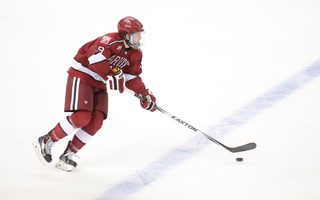UPDATED: November 13, 2014, at 9:30 p.m.
A senior thesis project introducing new color-coded labeling in some dining halls has raised concerns among some undergraduates who said that the system may cause additional eating-related stress.
Michael W. Seward ’15 is currently conducting a study to investigate whether students in undergraduate dining halls would make more nutrient-rich choices through the use of interventions such as labels, which are meant to “highlight evidence-based nutrition information in a condensed format.”
His study, which is based in part on a similar program at Massachusetts General Hospital, labels foods as red for less nutritional value, yellow for moderate nutritional value, or green for healthier options.
At Massachusetts General Hospital, the “stoplight” program caused sales of red-labeled items to decrease by 20 percent over two years, while sales of green-labeled items increased by 12 percent.
According to Megan O. Corrigan ’16, co-director of UHS-funded Eating Concerns Hotline and Outreach program, she and several other student staff members of the hotline recently met and discussed their concerns with the program.
“I don’t think any information should be suppressed, but I think that the way information is presented is important,” Corrigan said. “I find the stoplight program to be reductive because it defines foods according to moral categories and it defines foods individually…. If you were going to have a healthy meal, it would probably look like a mix of green, yellow, and red foods.”
The signs might adversely affect some students more than others, according to Corrigan.
“Even among students with normal eating habits, they might feel guilt about taking ‘red’ foods,” Corrigan said. “For students who have eating concerns or who have recovered from eating concerns, seeing foods labeled as red could be potentially very triggering.”
She also emphasized that ECHO was not taking a position as an organization, but rather she and other staff members were.
Seward said that he tried to ensure his program would not adversely affect students with eating concerns.
“I worked extensively with [ECHO] to learn how to sharpen the message of the study, which I believe is crucial,” he said, noting that the labels encourage students to make “more educated choices” and “do not ask students to never eat red-labeled food.”
Members of ECHO confirmed that correspondence had taken place.
“We know that the creators have good intentions and intend for this project to help not hurt students, but we are still concerned that it is having unintended effects,” ECHO co-director Hannah M. Borowsky ’15 said.
According to Corrigan, Lowell House Dean Caitlin M. Casey ’03 asked that HUDS remove the program from the Lowell dining hall “because it might be triggering.” Casey did not respond to repeated requests for comment.
Read more in College News
Currier Dean Takes BU Job, Will Depart at Year's EndRecommended Articles
-
Physicists Locate PulsarA team of Harvard/Smithsonian Center for Astrophysics scientists has located the third known visible light pulsar-one of the rarest, least
-
No HeadlineWE are glad to hear of the financial success of the Harvard Daily Echo. It is certainly deserved, if for
-
NOTEBOOK: Men's Hockey Tops Big Red in All-Around EffortCornell, which came into the game ranked No. 10 in the nation, outshot the No. 17 Crimson, 35-16, but had only five shots on goal during its four power-play opportunities in the first two periods.
-
 Yale Ends Men's Hockey's Season, ECAC Run
Yale Ends Men's Hockey's Season, ECAC Run -
 Men's Hockey Wins Big On Senior Night
Men's Hockey Wins Big On Senior Night













